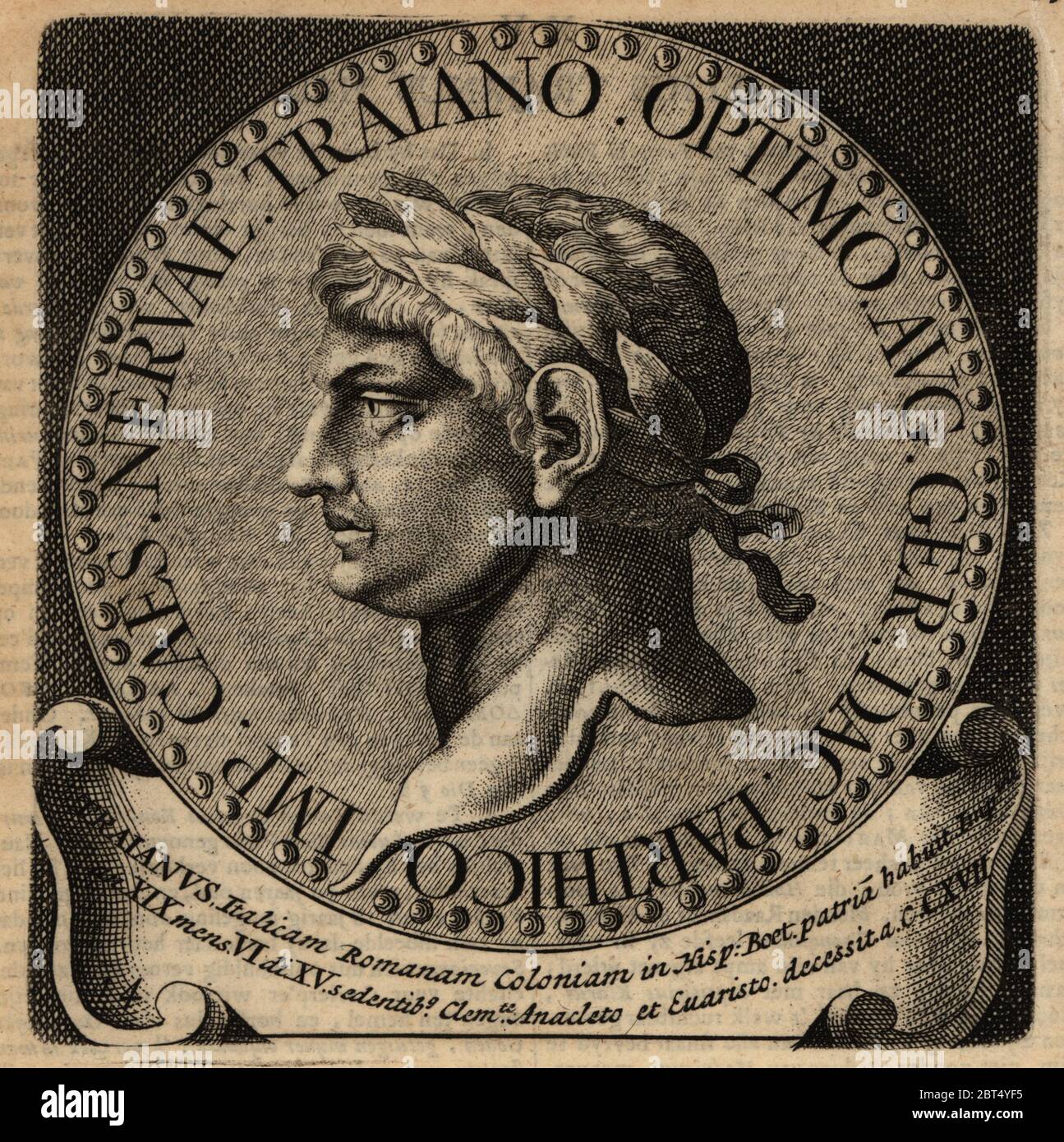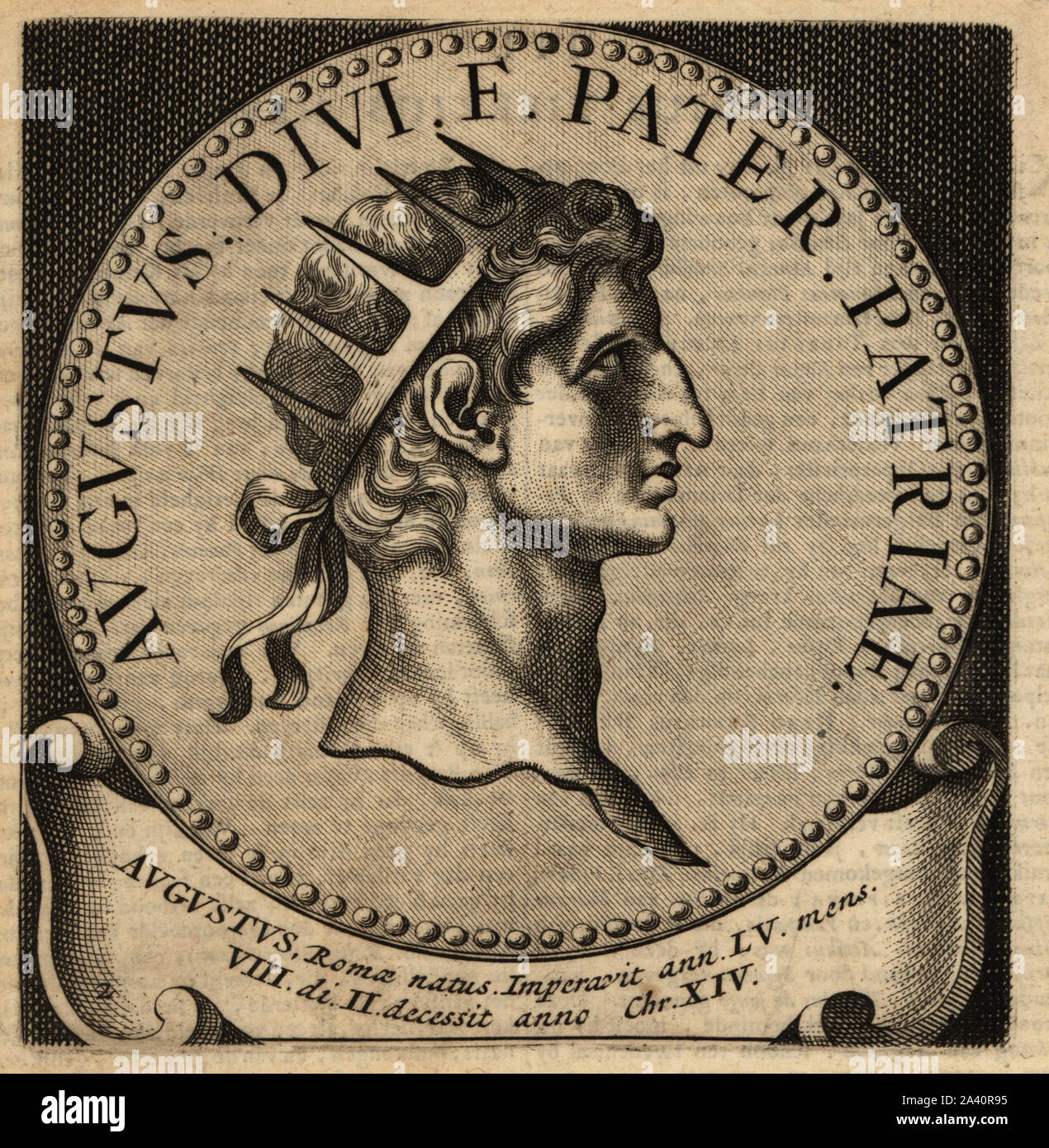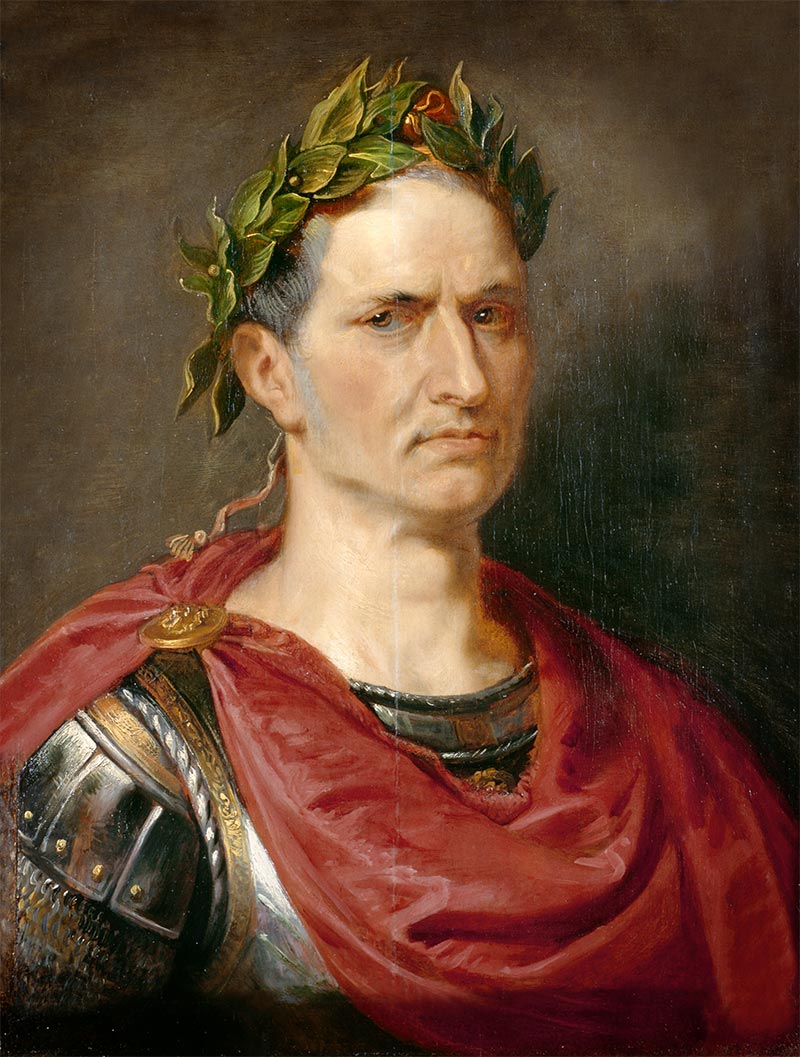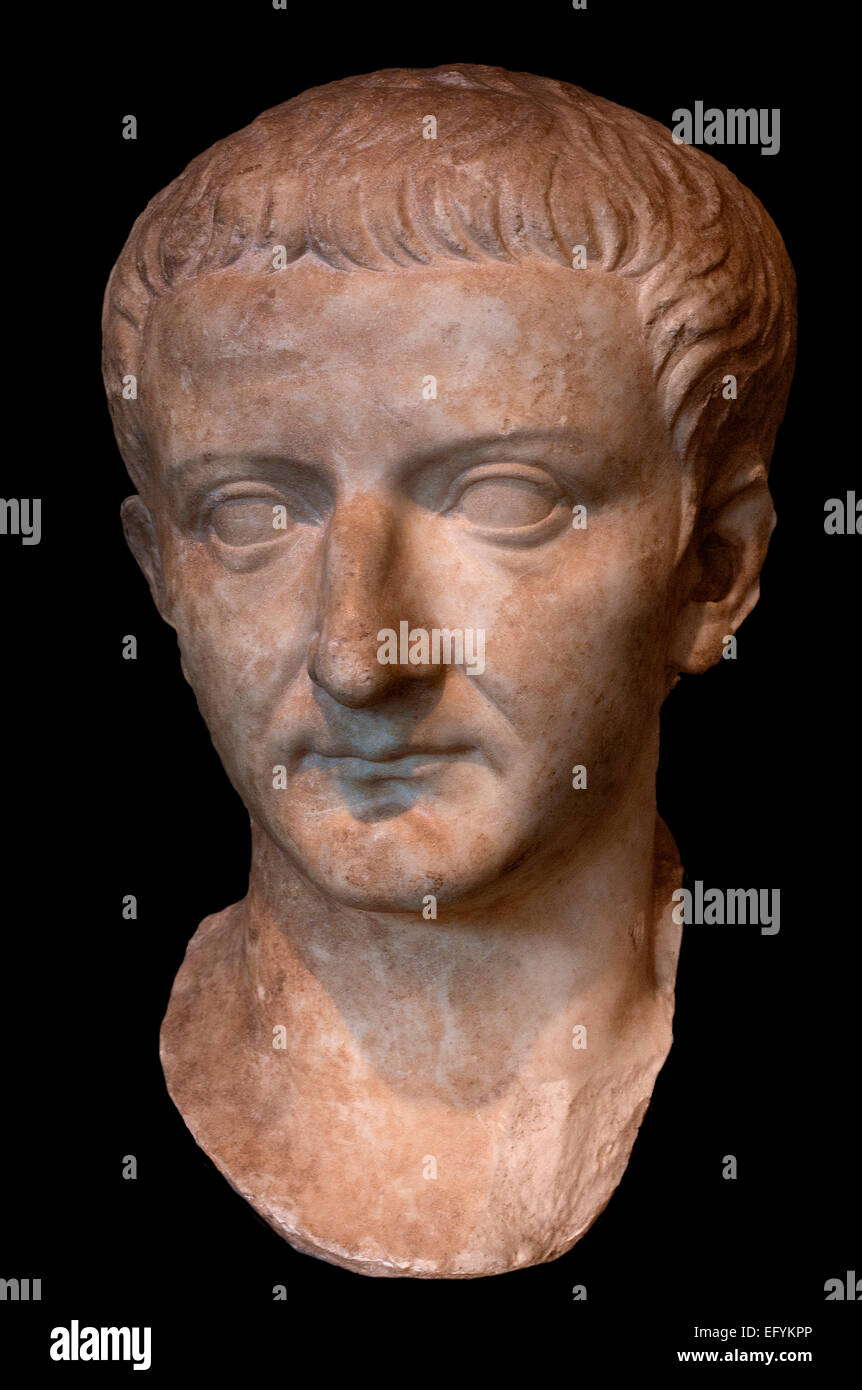
Gaius Octavius, future emperor Caesar divi filius Augustus the first roman emperor. Rome
Names. Portrait of Augustus as pontifex maximus 23 September 63 BCE: Gaius Octavius; 8 May 44: Gaius Julius Caesar; November 40: Imperator Caesar Divi filius 2 September 31 BCE: sole ruler 16 January 27: Imperator Caesar Divi filius Augustus; 19 August 14 CE: natural death Historians sometimes call him Octavian, a title he never used.. Relatives

Imperator caesar divi filius augustus hires stock photography and images Alamy
Augustus assumed he was the most powerful man in the whole empire. Roman coins bore a graven image of Caesar Augustus. A caption on the coin read: divi filius, "son of god." It was believed by Romans that Augustus, the first of the Roman emperors, was divine-conceived by a serpent as Augustus' mother lay asleep in the temple of Apollo.

Augustus who? Serapeion Humanitas
Imperator Caesar Divi Filius Augustus: Following his 31 BC defeat of Mark Antony and Cleopatra, partly on his own insistence, the Roman Senate granted him the additional name, "Augustus", which he added to his previous names thereafter. Historians use this name to refer to him from 27 BC until his death in AD 14.

Imperator Caesar Divi Filius Augustus 'Augustus of Prima… Flickr
Thus Augustus was called "Divi filius," but never "Dei filius," the expression applied to Jesus in the Vulgate translation of the New Testament, as, for instance, in 1 John 5:5, and in earlier Latin translations, as shown by the Vetus Latina text "Inicium evangelii Ihesu Christi filii dei" preserved in the Codex Gigas. As son of Julius Caesar.

Roman Emperor Augustus, Imperator Caesar Divi filius Augustus, 63BC to AD14. Roman statesman and
Trajan , in full Caesar Divi Nervae Filius Nerva Traianus Optimus Augustus or Caesar Nerva Traianus Germanicus orig. Marcus Ulpius Traianus, (born Sept. 15?, 53 ce, Italica, Baetica—died Aug. 8/9, 117, Selinus, Cilicia), Roman emperor (98-117). He had military commands in Asia and Europe before being named consul in 91.

Augustus Caesar Ancient Greek Sculpture, Ancient Statues, Ancient Artifacts, Ancient Rome
Tiberius Julius Caesar Augustus (/ t aɪ ˈ b ɪər i ə s /, ty-BEER-ee-əs; 16 November 42 BC - 16 March AD 37) was Roman emperor from AD 14 until 37. He succeeded his stepfather Augustus, the first Roman emperor.Tiberius was born in Rome in 42 BC to Roman politician Tiberius Claudius Nero and his wife, Livia Drusilla.In 38 BC, Tiberius' mother divorced his father and married Augustus.

Imperator Caesar Divi filius Augustus, Pontifex Maximus, Consul XIII, Imperator XXI, Tribuniciae
Caesar Divi Nervae Filius Nerva Traianus Optimus Augustus Also called (97-98 CE): Caesar Nerva Traianus Germanicus Original name: Marcus Ulpius Traianus Born: September 15?, 53 ce, Italica, Baetica [now in Spain] Died: August 8/9, 117, Selinus, Cilicia [now in Turkey] Title / Office: emperor (98-117), Roman Empire Notable Family Members:

The Birth of Caesar Augustus, 63 BC Landmark Events
In 42 BCE, the Triumvirate strong armed the Senate into naming Julius Caesar a god, Divus Julius, after which point, Octavian was able to add the title Divi Filius, the son of a god, to his.

El emperador romano Tiberio ( Tiberius Caesar divi Augusti Filius Augustus ) 42 BC 37 AD) 37
Divi filius is a Latin phrase meaning "son of a god", and was a title much used by the emperor Augustus, the grand-nephew and adopted son of Julius Caesar . Octavian

FileMSR Imperator Caesar Divi Filius Augustus 02.jpg Wikimedia Commons
Gaius Julius Caesar Augustus (born Gaius Octavius; 23 September 63 BC - 19 August AD 14), also known as Octavian (Latin: Octavianus ), was the founder of the Roman Empire; he reigned as the first Roman emperor from 27 BC until his death in AD 14.

Imperator Caesar Divi Filius Augustus by DioMEMEdes on DeviantArt
Pax Romana The long period of relative peace and minimal expansion by military force experienced by the Roman Empire in the 1st and 2nd centuries CE. Also sometimes known as the Pax Augusta. Ara Pacis Augustae The Altar of Augustan Peace, a sacrificial altar that displays imagery of the peace and prosperity Augustus achieved during the Pax Romana.

Emperor Tiberius 1437 AD ( Tiberius Caesar Divi Augusti Filius Augustus ) Roman Germanic Museum
Augustus Caesar ruled at the time of the birth of Christ and lived from 63 BC to AD 14. He was the first Roman emperor to use a particular title, and it was in fact his favorite title. In Latin, the title is Divi filius, or "son of a god." Augustus was the adopted son of Julius Caesar. One of Julius Caesar's favorite titles was "Divine Julius."

Imperator Caesar Divi Filius Augustus in partes Pontifex M… Flickr
Augustus is often labelled as "first emperor of Rome" and "founder of the Principate". Both descriptions hide a much fa complex and fluid political transformation that affected all areas of Roman society during the period when Augustus was princeps.
/augustus-58b603243df78cdcd83dfc26.jpg)
An Overview of the First 12 Roman Emperors
Divi filius, translating as 'son of the divine', showed that whilst he himself didn't have a "god complex" and wasn't an autocrat, he was on the shoulders of the gods, enhancing his legitimacy. [citation needed] Caesar forged a connection to the deified Julius, illustrating where he got his authority. This would have gone down well with.

Imperator Caesar Divi Filius Augustus by ConfusedEpicurean on DeviantArt
Augustus Key information: Official Name: IMPERATOR CAESAR DIVI FILIUS AUGUSTUS Birthdate: September 23, 63 BCE. (Suetonius, Life of Augustus, 5.1) Birthplace: Rome, Italy. (Suetonius, Life of Augustus, 5.1) Reign: Became sole ruler of the Roman Empire after his victory over Mark Antony and Cleopatra at the Battle of Actium on September 2, 31 BCE.

El emperador romano Tiberio, 42BC37AD, Tiberius Caesar divi Augusti filius Augustus. Tiberius
The comet of 44 BCE is one example of the way in which astronomy played a role in political narratives, given its use to legitimate the young Octavian (later known as Augustus) as a significant and serious figure in the politics of the late Roman Republic. We can look at the fact of this comet's occurrence and its interpretation as a case.